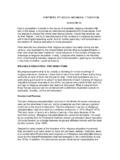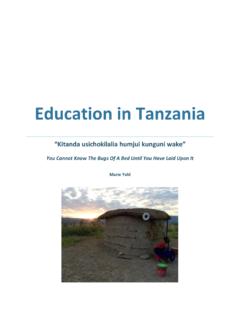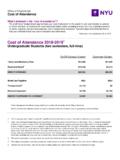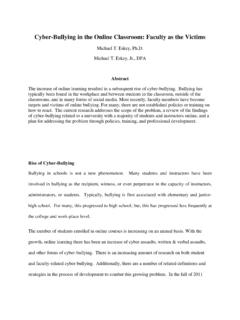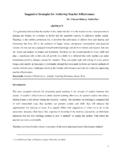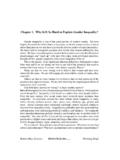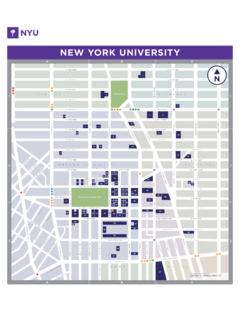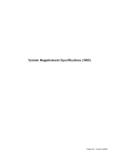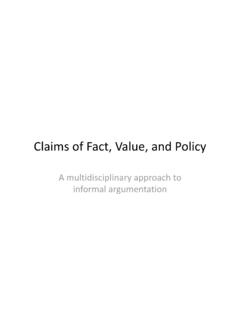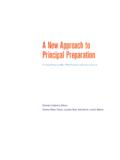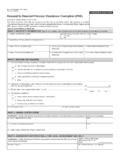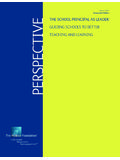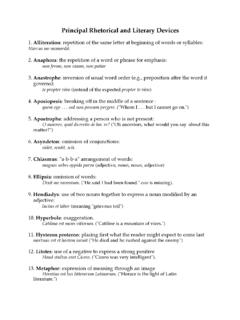Transcription of Principal leadership for private schools …
1 Principal leadership for private schools improvement: The Singapore perspective Abstract This paper aims to examine leadership qualities among private school principals in Singapore. Findings from the study indicate that effective principals are able to establish trust, create structures that promote Principal -teachers communication and maintain a high level of moral values. Specifically, it presents the findings from the case of ten private schools in Singapore. Included an overview of the study and a discussion of emergent themes and questions related to the roles of the principals and the relations between school and the community. The results from our study indicate that financial goal rank top above all other goals set by the private school principals. The emphasis on maximizing financial gain is a cause of concern as many school principals have lost their intellectual integrity as well as their academic values in their pursuit of financial gains.
2 Keywords: Principal ; school leadership ; school reform, organizational change CHAPTER 1 INTRODUCTION This paper aims to examine the leadership qualities among private school principals in Singapore. It looks at the growth of the private School industry in Singapore. Data were obtained from field studies as well as published reports of the Government ministries. Specifically, it presents the findings from the case of ten private schools in Singapore. Included is an overview of the study and a discussion of emergent themes and questions related to the roles of the principals and the relations between school and the community. The results corroborate our hypothesis that the private school industry has emerged not only as a complementary sector to the traditional school sector, but also as a profit-making industry. The profit-making objectives are causes of concern as many school principals have lost their intellectual integrity as well as their academic values in their pursuit of financial gains.
3 In the first section of this article, the researcher summarizes the objectives of the study and the research questions. A background of the private school industry is included. Next, a review of the literature on Principal leadership related to professional development and school improvement is discussed. The following section analyses the findings of the study and considers the implications of the analysis for Principal leadership and areas for future research. OBJECTIVES OF THE STUDY This paper examines the trends of growth of the private school industry in Singapore and aims to throw some light on the leadership of private school principals. It also looks at factors that have remained the driving force in the development of the private school industry. The main objectives of this study are: 1) to study the structure and trends in the growth of the private schools in Singapore, 2) to ascertain the leadership qualities of private schools principals, and 3) to understand the expectations of educational leadership in the private school environment.
4 4) to determine what factors contributed to the effectiveness of the schools 5) what quality the Principal possesses to lead the school effectively. RESEARCH QUESTIONS 1. What is the state of leadership among private school principals? 2. What is the principals perception of their leadership roles? 3. What are the constraints and difficulties that the Principal face when he takes up these leadership roles? CONTRIBUTIONS OF THE STUDY Though this study was conducted in Singapore, its relevance and significance is far from being merely regional. The implications are likely to go beyond geographical, cultural and social boundaries. There are a number of potential contributions that this study makes, both theoretical and practical. In theory related issues, the key areas where this study makes a contribution: 1) Principal leadership : There are certain attributes that are considered important personal and professional.
5 The importance of this study is related to professional development of principals of private schools . If principals are able to identify the vital links connecting student learning, staff motivation with Principal leadership , they will be better prepared to be leaders. In school improvement and development process, the leadership roles of principals are highly important. Without the changes of the their perceptions of their leadership roles, change will be minimal and difficult. Principals understanding and perceptions of their own roles in facing new demands in school restructuring are essential for these will affect the outcomes of reforms as their interpretations may shape their role-taking behavior. 2) Policy Makers This study is also helpful in providing policy makers with certain suggestions to improve the private education sector. The introduction of a certification scheme for private school principals could be considered.
6 Among the criteria to be considered are qualifications and experience of the principals. Thus, the Principal have to become not only a Chief Administrator but also a professional leader. In addition to focusing on profit-generation motives, the Principal must create a school culture which promotes teaching and learning. The research findings show that most principals place profit-making as their number One priority, on top of everything else. Policy makers, however, should be careful not to introduce over-restrictive regulations which may suppress the operations of the private schools . private schools should be seen as a viable alternative to students who may not be able or do not wish to enroll in the public schools for some reasons. Organisation of the dissertation In Chapter One, the researcher laid out the Introduction, the objectives and research questions, and contributions of the dissertation. In Chapter Two, the background of the study describes the private schools environment in Singapore.
7 The roles of private schools and the different categories of private schools were introduced. In Chapter Three, there is an extensive review of literature relating to school leadership , in particular Principal leadership . In Chapter Four, the methodology of this study is discussed. It explains the approach of the study and the underlying rationale for the choice of the approach. The data collection method and the techniques deployed are presented. The data analysis methods are also discussed. Chapter Five presents the research findings and the discussion of the results. The results from the respondents are analysed thoroughly to explore the effectiveness of leadership roles among private school principals. Chapter Six concludes the study by making some recommendations, discussing the limitations of the study and the implications for future research. CHAPTER TWO BACKGROUND OF THE STUDY Enrolment at Singapore s private schools have been growing rapidly to 409,479 in 2006.
8 Of these figure, 151,430 or 37% are full-time students. There were a total of 1203 private educational institutions in Singapore of which 642 are commercial schools . The private sector plays a complementary role of running continuing / supplementary education classes in commercial and business studies, computing, language and fine arts courses. private schools offer courses at the certificate, diploma, bachelor and postgraduate levels. Through collaborations with international universities, private schools offer students the opportunity to attain international certification. In Singapore, only the government universities have the license to issue degrees. Unlike countries such as Australia or Canada, Singapore s private schools do not receive any government funding. Because there is no government funding, private schools in Singapore do not have to comply to values such as equality of opportunity, the right of all children to a high-quality education, rejection of discrimination and respect for ethnic differences.
9 However, there are much consensus among owners of private schools that they have a moral obligation to contribute to the development of students as well as respect for tolerance of difference especially in a multi-cultural multi-religious nation such as Singapore. There are mixed feelings as to whether private schools are just enterprises with profit-making as their main motives. Like any private enterprise, private schools strive hard to attract customers and offer them the best possible value. School choice is transforming the face of education in Singapore with no sign of dissipation. Recent trends indicate that private schools will continue to be an important alternative to traditional schools . The current quantitative query utilized structured interviews with school principals and administrators to find out: 1) Why students choose private schools ?
10 2) How private schools compete in the education reform environment? 3) What contributions that private schools made in Singapore? To ensure that private schools in Singapore safeguard students welfare through high standards of education, the government has introduced a key initiative the CaseTrust for Education. The roles of private schools in Singapore: It is widely acknowledge that education is an important source of economic and social development in Singapore. private schools in Singapore face many disadvantages: lack of funding, low image with local students, and profoundly strict regulatory environment. Yet, despite these obstacles, private schools have managed to survive and thrive, finding a niche for themselves and contributing to the development of Singapore as a global schoolhouse. The main challenge facing private schools is the bias against private schools .
